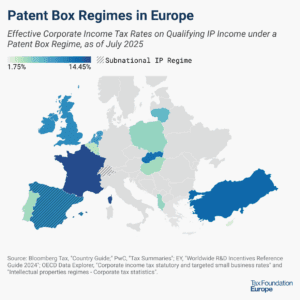
New Study Raises Questions about European Commission Proposal to Tax Digital Companies
3 min readBy:A new study by the European Centre for International Political Economy raises five questions about the European Commission’s proposal to place a new taxA tax is a mandatory payment or charge collected by local, state, and national governments from individuals or businesses to cover the costs of general government services, goods, and activities. on the revenues of large digital services companies that the Commission has not answered. This study follows a previous report showing the Commission’s justification for the new tax (that digital companies are undertaxed, or have caused tax collections to slump) is not supported by the underlying data. The author of the new study, Dr. Matthias Bauer, analyzes the proposed tax on digital services using economic evidence of other business taxes. He finds that such a tax would likely lead to many negative, unintended consequences, and that the European Commission should consider these negative effects before proceeding with the new tax.
Who would pay for the digital services tax?
The study notes that the Commission has not addressed one of the most critical aspects of tax policy: economic incidence, or who actually bears the cost of the tax. People, not organizations, pay taxes. And in the case of corporate income taxes, the people who bear the brunt of the burden are workers.
It is not likely that a revenue tax would fall hardest on shareholders, especially in the case of digital services, because capital is mobile and can flow to where it will earn the highest after-tax return. This means that others in the economy would be most impacted by the tax—the study suggests the burden would fall on self-employed persons and workers employed by firms that depend on digital advertising and online platform sales, as well as final consumers.
How would the tax affect others in the economy? And, would the tax have a disparate impact on certain firms?
Because it is unlikely that the brunt of the increased tax burden would rest with shareholders, it’s important to evaluate which economic agents the tax would impact. Many firms would pass the cost of the tax to downstream users and customers, and it is possible that firms could over-shift the effects, leading to greater changes in price than the original tax increase. The study points out that this could affect customers, other businesses including small and medium enterprises, self-employed persons, as well as public institutions that utilize digital advertising and other online services.
Using European Union (EU) survey data, the study then raises the question of whether small and micro businesses would be particularly hurt by the digital services tax. If smaller businesses comprise the largest share of digital services consumers, which evidence suggests, then such a tax could adversely impact smaller firms relative to larger firms.
Stay informed on the tax policies impacting you.
Subscribe to get insights from our trusted experts delivered straight to your inbox.
SubscribeWould the tax discourage investment in the European Union? Would the tax hurt innovation and prevent convergence?
The study also notes that the Commission has not evaluated how the digital services tax would affect investment or innovation. Bauer argues that the effects of a tax on revenues could look like the effects of a tax on corporate income; meaning, this new tax would amount to a tax on investment. Any tax on capital increases the cost of capital (the cost of investing) and thus discourages investment. Additionally, it would make the EU a less attractive place for digitally-enabled businesses to be located, discouraging companies from growing and investing in the EU.
The report also notes that taxing the revenue of digital services companies is akin to taxing the benefits of their innovation. Increasing the cost of adopting these innovations risks creating a barrier for firms to grow and innovate, causing a drag on economic growth and convergence.
The report concludes by pointing out that the European Commission has not presented sufficient evidence of the consequences of the digital services tax. It is incorrect to assume that shareholders of digital services companies will bear the burden of this tax without any downstream consequences or harm to others in the economy. The questions Bauer asks the Commission to address, about economic incidence and secondary economic effects, are important questions for all policymakers to keep in mind when evaluating tax policy.
Share this article





